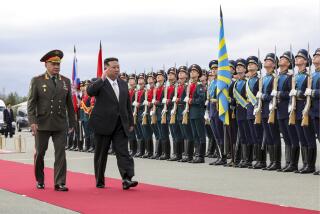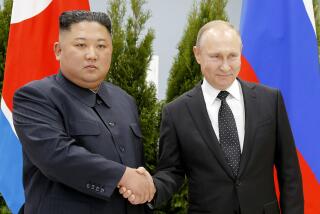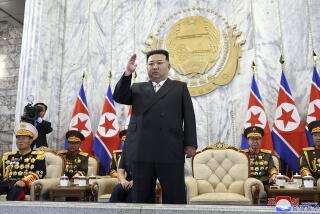Famine Is Still Ravaging N. Korea, Congressman Says
- Share via
TOKYO — Rural hillsides in North Korea are lined with a growing number of new, white grave markers glistening in the sun, and many of those lucky enough to avoid such a fate remain gaunt, disease-ridden and forced to subsist on a diet of ground twigs, leaves and cornstalks, Rep. Tony P. Hall (D-Ohio) said today.
“The hospitals are operating by sunlight because there’s no power,” said Hall, who just ended a five-day visit to the isolated Communist state. “And they have to hold people down because there’s no anesthetic. You see cotton balls out drying so they can reuse them.”
Hall said life in Pyongyang, the capital, seems better than a year ago--there are more bicycles and trees--but this might be for show. Most visitors are shown only the capital. In rural areas, however, conditions have deteriorated during four years of famine and flooding, he said. “These people are going over the edge.”
All evidence suggests that North Korea’s collective farming and planned economy, hit hard by the loss of Soviet bloc trading partners, is now in shambles. For every 20 factories Hall said he saw, only one was operating. In Chongjin, an industrial center in the northeast, giant model steel mills stand eerily silent, he said. “You’ll stay in the best hotel they have, and there’s no running water.”
In small towns, people grind leaves, cornstalks and twigs into powder and make noodles out of it before turning up at hospitals with acute stomach problems. Hall reached into a white plastic bag and pulled out a handful of dry, crusty leaves and straw from one food distribution center. “I asked if I could take some,” he said. “They call it substitute food. You’ll see a kid chewing on a corncob and, as soon as you go over, they’ll whisk him away.”
The congressman said that, although no official said so directly, he believes North Korea is pleased with former U.S. Defense Secretary William Perry’s appointment as special envoy because it suggests that Washington is taking them seriously. Still, Pyongyang refers to upcoming talks over its nuclear ambitions as a “headache,” he added.
Hall said the United States needs to take a firm but patient stance with the hermit kingdom. Saber-rattling and hard-line dictates by U.S. politicians with no direct experience in the region are dangerous and destabilizing, he said, particularly at a time when tensions are rising with Iraq. The West should continue sending food aid despite North Korea’s political intransigence, he added, in order to ease its human suffering.
Hall said he saw no evidence either directly or in consultations with aid groups that foreign food shipments were being diverted to the military or the government. Misunderstandings might arise because military trucks are the only vehicles still working, he said. Government elites might get first dibs on domestic harvests, but they don’t appear to be cornering the imports.
Hall said 90% of the country’s water is contaminated, and diarrhea, dysentery and other water-borne diseases are rampant.
“At orphanages, I saw room after room full of children with sores, scabs and swollen faces--all signs of malnutrition. There was hardly any noise coming out of these children,” he said.
Overall, 30% of the North Korean children ages 1 and 2 are severely malnourished, and two-thirds of all children stunted, he said.
More to Read
Sign up for Essential California
The most important California stories and recommendations in your inbox every morning.
You may occasionally receive promotional content from the Los Angeles Times.










